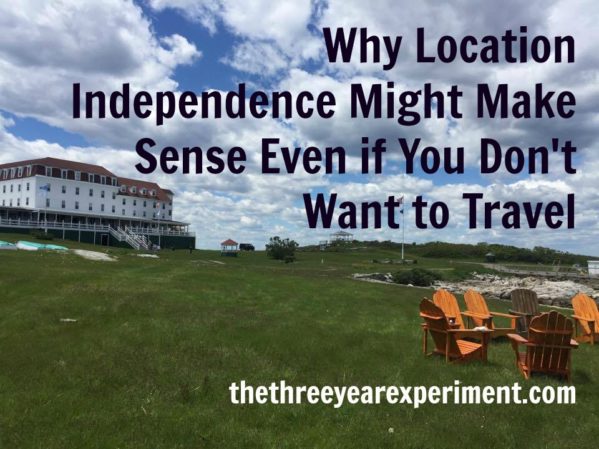Lots of people, including our family, talk about location independence. What does it mean, exactly?
In the broadest definition of the phrase, location independence means being able to live wherever you’d like in the world. People achieve this in different ways.

If you’re financially independent, and have enough assets or investments to live off indefinitely, you can probably become location independent without too much trouble. If you keep your cost of living the same, you can probably pull from your investments from anywhere around the globe. Yes, you might have some hoops to jump through to get there, like health insurance, but if you’re no longer working to pay your bills, chances are you have the freedom to move from place to place.
Lots of people have engineered location independence by becoming remote workers. They can move wherever it makes most sense for their families because they have the freedom to work from wherever there’s a reliable internet connection.
Freelancers are often location independent. Part of the attraction of becoming a freelancer is setting your own schedule and working from home or on the road as you travel. The successful blogger Michelle from Making Sense of Cents travels the US in an RV while managing a seven-figure business from the road (hats off to you, Michelle!).
People who have income from royalties or real estate are often able to manage their businesses from a remote location, like Paula from Afford Anything. Her rental properties are in Atlanta and she currently lives in Las Vegas. She uses a trusted property manager to manage things remotely.
Our family has a goal of becoming location independent in three years. What we would love to do is convert Mr. ThreeYear into a remote worker at his current company, which he loves, so we are not tied to New England, where we currently live.

We’re also considering the possibility of me getting a job with an international school as an ESL teacher. In this scenario, if Mr. ThreeYear didn’t convert to a remote employee, then we wouldn’t technically be location independent, because I’d be tied to one location because of my job. That’s why the second part of our plan is to double our net worth, so that we’ll have an ample cushion of funds to support us if I, with a lower-paying job, were the main breadwinner for a couple of years.
Ok, but what if you’re perfectly happy where you are? What if you currently love where you live and don’t want to move? Or what if you’re not really interested in traveling the world? What does location independence have to do with you?
In this post, I’m going to propose my 6 thoughts on why working toward a location independent job might make sense, even if you’re not planning on going anywhere. For those people who love going to work everyday and interacting with coworkers, none of these reasons may sway you. But for those of you who are tired of commuting, who’d like to reduce your carbon footprint, or who want the freedom to see the world outside of a 2-week-per-year vacation schedule, read on!

One note: there are a lot of ways to become location independent, and some of them take a while.
If you decide to build up a freelance business, for example, chances are it will take a couple of years of lots of extra hustle to build up your business to the point where you can replace your income. But if that flexibility is something you’re after, there’s no time like the present to start!
1. Time freedom
If you work from home and/or make your own hours, chances are you can adjust your schedule so that you have more freedom during the day. If you’re a night owl, you can start your day later and finish up at night, when you’re at your most productive. You can take a break mid-day for a run, or to get together for an extended lunch with friends. You can be available for service appointments. You can use mid-day, when traffic is light, to run errands. There’s also not the constant feeling of watching the clock, or being at work just to fulfill a certain number of hours.

2. Flexibility to help out a sick or older family member
Those who have older parents who need assistance would benefit from the flexibility of working from home. Their parent may not need around-the-clock care; instead, it may help to be present at home in the event there’s an emergency, or just for your peace of mind.
3. The ability to set your own hours
Some people, like those with school-aged kids, need the ability to work non-traditional hours. If they have a flexible, work-from-home job, they can adjust their work hours so that they work during their kids’ school hours and after they go to sleep (or before they wake up). My friend who works remotely starts her at-home work day at 5am, so that she can log off at 3pm, pick up her kids from school, and then finish up her work at 8pm, after the kids are in bed. This works great for her and gives her the ability to be there for her kids for after-school activities and homework.
4. The possibility of spending half the year in one location and half in another
This was one of the reasons that our family first considered location independence. Because Mr. ThreeYear’s and my respective families live on two different continents, we dreamed of the ability to live six months in one location and six months in another. I first got the idea from a flight attendant who attended a TESOL course with me right before I moved to Chile. She spent half her year in Montreal and the other half in South America. I couldn’t believe anyone did that! But her job allowed her to fly out of both places, so it worked for her. For years, that idea seemed like only a dream, but now that we’ve started to explore location independence, it seems more and more realistic. Depending on what you do, this may or may not be a possibility. But it definitely wouldn’t work if you had a traditional 9-to-5 employment situation!
5. The ability to multi-task
Ok, I know that multi-tasking is somewhat of a misnomer, since people who “multi-task” have been shown to take longer to finish both tasks since they’re switching their attention back and forth. But if you have to be on an achingly long conference call, why not use that time to sweep the floor or throw in a load of laundry?
6. The benefits to the environment
If you work from home, you eliminate one more car on the road in the mornings and afternoons. If you grab lunch from the cafeteria each day, you’ll eliminate the plastic cutlery and disposable containers if you eat your lunch in your own kitchen. You eliminate the energy needed to heat and cool your office or workspace.

Currently, Mr. ThreeYear and I both have traditional jobs that require us to be at a specific place during our workweek. We both have commutes and little schedule flexibility. However, we’re both working on creating more flexibility and freedom in our jobs. Mr. ThreeYear has been working from home once a week, when possible, and I have been developing a freelance writing business so that I can create a more flexible income stream. We have more than two years left on our three year plan, but in the meantime, we are working towards a bit more freedom and flexibility as we save and work our way to location independence.
I’d love to hear from you! Is your job flexible? Do you work from home? Do you work in an office building with a traditional schedule? What do you dislike/love about your current situation?


As out outlined, Location Independence can come in so many different shapes and sizes. I currently work remotely from a home office (which is primarily my true home office, but can also be a coffee shop, a cabin, or a relatives house when we go for a visit). I often work in the hours of 8am-4/5pm, but I have the flexibility to shift that based on needs. I have a 9am appointment? I’ll work 10am-6pm. My son needs to be picked up early? I’ll work 6am-3pm. The location and time flexibilty has become one of the biggest perks and I am very grateful for it!
That’s awesome! I would love the flexibility of working remotely. And as you point out, you can work wherever you are, which I’m guessing makes mini trips easier! Looking forward to checking out your blog!
Theoretically, I could choose which jobs I take and which I don’t (they require me to re-locate for the duration of the contract), but since I’m starting out, I’m taking anything and everything that comes my way if there’s no conflict with previous commitments! And between gigs, I can dedicate time to writing and blogging, and pick up a joe-job to keep me productive and busy : )
That’s cool that you get to travel with the jobs, Ms. Raggedly Rich! And it gives you time to work on your novel! 🙂 I agree, I need jobs/goals/something to keep me productive, too! Good luck with the next gig!